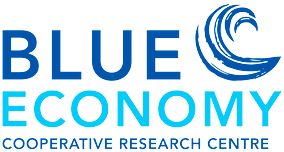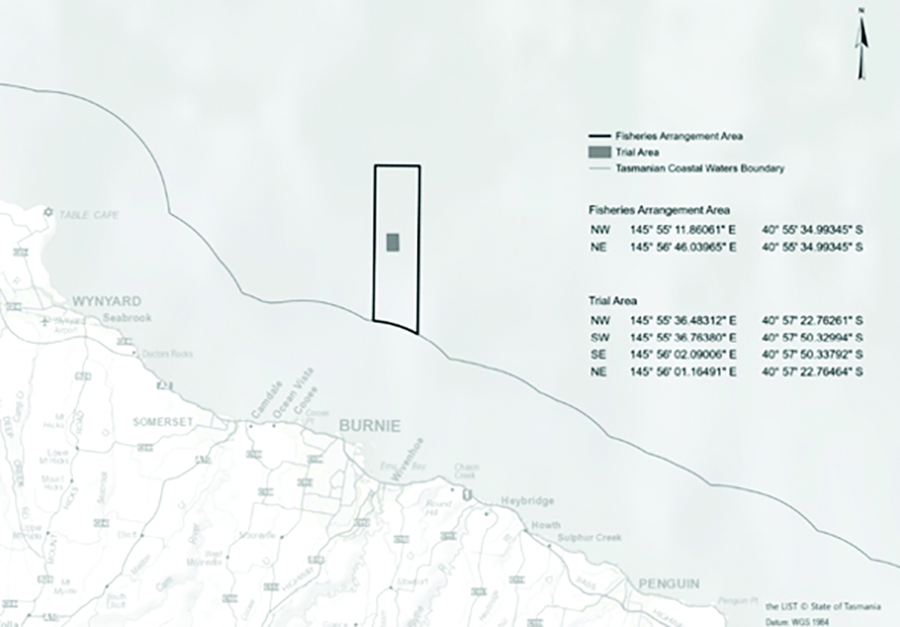Bass Strait Blue Economy Zone
In the ocean economy, emerging and transitioning industries face challenges associated with the ‘shared’ nature of the ocean. Approaches like ecosystem based management, multiple use management along with tools like marine spatial planning provide a contemporary and equitable basis for entering new ocean space. However, the success of these emerging ocean industries will ultimately come down to contemporary leadership.
Globally, the drive to develop open ocean aquaculture acreage and capability is no exception. While aquaculture is recognised to have a critical role in future food production, its growth is ‘framed’ by other ocean users and community values and sentiment as much as market and demand trends.
Today, aquaculture’s importance to the ocean economy is also shifting beyond just food production. It has an emerging role in restoration of coastal and marine ecosystems. While markets and innovation are further driving new sectors, like seaweed as a standalone and as a co-located venture. Investor and retailer benchmarking is demanding circular economy solutions and decarbonisation efforts.
These trends are driving diversification, innovation, productivity, and growth of the industry in Australia, and some states are opening waters and coastal areas through dedicated aquaculture planning regimes. However, new ocean space for acreage is patchwork, and the likelihood of operating in these new waters remains untested due to a suite of risks that must be overcome.
Considering the risks and costs associated with these acreage and capability challenges and the critical need to balance growth with existing users and natural ocean values, the Blue Economy CRC took the first step to introduce a new era of aquaculture into Commonwealth waters.
WHAT IS A BLUE ECONOMY ZONE?
RESEARCH TRIAL SITE
A three-year research trial will take place within the designated research trial site in Commonwealth waters north of Burnie.
Through this research, the Blue Economy CRC is looking to work with industry, commercial, university and government Participants to test the capability of existing and new sustainable offshore aquaculture systems for finfish, while exploring opportunities for seaweed and shellfish.
The trial needs to consider: the examination of environmental conditions; environmental impacts are monitored and mitigated; wildlife impacts are monitored and mitigated effectively; assessment of economic viability of sustainable aquaculture in Commonwealth waters and potential benefits for the Tasmanian and local economies; further assessment of any impacts on other marine users; and assessment of the operational feasibility and suitability of open ocean aquaculture.
Research proposals approved for the trial are required to comply with all relevant Tasmanian and Commonwealth legislation, including the Commonwealth Environment Protection and Biodiversity Conservation Act 1999.
No research proposal has been put to the Government for approval yet. This is forecast to follow the release of the Tasmanian Government’s Aquaculture Research policy guidance.
THE CHALLENGE
There is no regulatory and planning basis for establishing aquaculture operations in Australian Commonwealth Waters. Operating in Commonwealth waters which is naturally a high energy profile at great distance from land, comes with risks, including needing to test current range of capabilities of infrastructure and operational approaches and to identify innovation that sits beyond current capabilities or available capital expenditure spend.
THE OPPORTUNITY
The development and road testing of a blueprint for open ocean aquaculture acreage and capability that reduces the current risks by defining and delivering best practice: policy, regulatory, planning, engagement, operational, innovation, infrastructure, sustainability, environmental monitoring and management, collaboration and aquaculture literacy.

2019

MID 2020

LATE 2020

2021

SEPT 2021

FEB 2022

MAR 2022

JUN 2022
The Achievements (to now)

Opportunity identified (2019)
Blue Economy CRC and participants identified that offshore expansion of aquaculture and renewable energy in Australia is limited by the regulatory environment.


Broad area of interest identified (Mid 2020)
An area of research interest in Bass Strait identified using marine spatial planning data and commercial participant input relevant to aquaculture and renewables.


Commenced baseline monitoring (Late 2020)
BEZ Baseline Phase I research project kicked off to collect physical data and run a seabed and mobile fauna survey within area of interest. Continued with BEZ Baseline Phase I research project.


Proposed research trial site identified (2021)
Project team identified a proposed research trial site within the board area of interest using baseline monitoring data, input from participants and other ocean users.


MOU Signed (September 2021)
The Australian and Tasmanian Government entered into a Memorandum of Understanding to support and deliver sustainable aquaculture research in Commonwealth waters adjacent to Tasmania, signing off on Australia’s first Blue Economy Zone.


Public consultation on proposed research trial site (February 2022)
The Australian Government undertook community consultation on the proposed research trial site. This received 1352 responses and resulted in a reduction of the final fisheries arrangement area announced in April 2022.


Aquaculture Research Bill (March 2022)
The Tasmanian Government’s Living Marine Resources Management Amendment (Aquaculture Research) Bill 2021 was passed by Parliament. This facilitates future research into offshore aquaculture in Commonwealth waters adjacent to Tasmania.


BEZ Research Series (June 2022)
The BE CRC commissioned a series of expert data analyses and reports including commercial fishing and seaweed.
THE CONVERSATION

“”
Our purpose is to undertake research in promotion of growing Australia’s blue economy led by sustainable aquaculture practices incorporating seaweeds, shellfish and finfish. We have been surveying baseline information off the north coast of Tasmania for over a year and have a good understanding of the physical, chemical and ecological characteristics of the area.
John Whittington
CEO, Blue Economy CRC
“”
Enabling this research will allow us to fully examine the economic, environmental, and operational feasibility for aquaculture in these waters, and help inform the development of contemporary legislative frameworks to support future sustainable aquaculture in our oceans.
Jo Palmer
Tasmanian Minister for Fisheries




